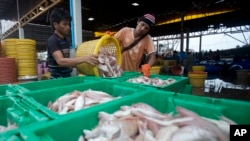Governments must provide migrant laborers with the same benefits and social protections they give their own citizens, which will boost their economies and worker productivity, a United Nations official said.
Of the estimated 232 million migrants in the world in 2013, more than 95 million are from the Asia-Pacific region, according to the U.N.'s Asia-Pacific Migration Report 2015 launched this week in Bangkok.
Migrants contribute significantly to GDP growth in host countries, while sending home about $435 billion in remittances to the Asia-Pacific region in 2015, said Hongjoo Hahm, deputy executive secretary of the U.N.'s development arm for Asia and the Pacific.
Yet many face abuses at every step of the way, from recruitment agencies and job brokers at home to exploitative employers, officials and police abroad.
It is the responsibility of governments in the countries that send and receive migrants to have domestic, regional and inter-country discussions to create the policies and conditions necessary for safe migration, Hahm said.
"When the recipient country provides social protection for the migrants - that is, health care, unemployment compensations, social safety net, education for their children... productivity of the migrants increases. It clearly has a benefit to the national economy," he said at the report's launch on Monday.
"Treat them with dignity, treat them fairly, and provide the same protections that you provide your citizens, and... you will be rewarded for it."
Origin countries, he said, must create a system for orderly and structured migration.
"Too often, migrants have to rely on intermediaries that charge them exorbitant fees, and they are forever in debt, paying off their debt," he said.
"Creating fairness in terms of the employment process, both at the recipient country and at the home country, is really crucial, so that you get rid of the middlemen and you make migration a labor movement policy that we see in other parts of the world."
The region's top country of origin for migrants in 2013 was India, with 14 million migrants leaving the country, followed by Russia, China, Bangladesh, Pakistan, the Philippines, Afghanistan, Kazakhstan, Turkey and Indonesia.
The top destination in the region that year was Russia, with 11 million migrant arrivals, followed by Australia, India, Pakistan, Thailand, Kazakhstan, China, Iran, Malaysia and Japan.
Most of the region's migrants go to nearby or neighboring countries - with Asia-Pacific hosting about 59 million migrants - while others go further afield to work in places such as the Middle East and North America.
Hahm cited the Philippines - which sends about 2 million citizens abroad each year - as a country that supports migrants as they prepare to go abroad, and also helps them to acclimatize to life back home when they return.





